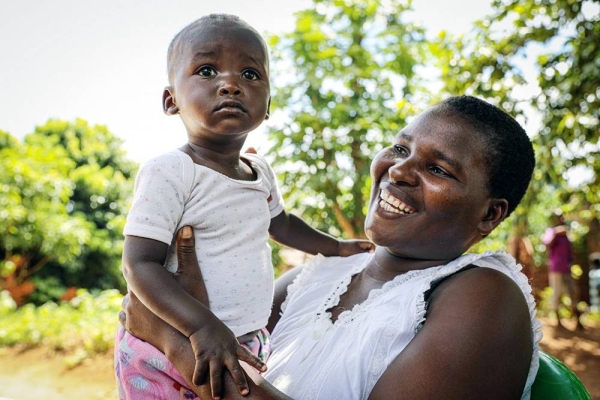
WHO UNICEF and the World Bank are working closely with health authorities to keep Yemen polio-free and curb the spread of measlesSupport from the World Bank, WHO and UNICEF critical to reach every vulnerable child
SANA’A, 8 April 2017 — In an effort to keep Yemen polio-free, nearly 5 million children under the age of 5 have been vaccinated in a nationwide campaign covering all governorates in the country. The campaign was supported by a partnership between the World Bank, UNICEF and WHO launched in February 2017.
Despite intensifying violence in Sa’ada governorate, more than 369 000 children between the ages of 6 months and 15 years were immunized against measles – a highly contagious and potentially fatal disease - and over 155 000 children under the age of 5 were vaccinated against polio.
Thousands of dedicated health workers, health educators, religious leaders and local council officials played a key role in mobilizing their communities to maximize the immunization campaign’s reach. Thanks to their support, high-risk groups, such as internally displaced persons and refugees, have also been vaccinated.
“WHO, UNICEF and the World Bank, are working closely with health authorities to keep Yemen polio-free and curb the spread of measles,” said Dr Nevio Zagaria, WHO Representative in Yemen. “This partnership provides continuous support to national health authorities to increase vaccination coverage for vulnerable children across Yemen.”
Before 2006, measles was one of the leading causes of death in children under 5 years old in Yemen. But several measles campaigns supported by WHO, UNICEF and the World Bank have succeeded in drastically reducing child deaths from the disease.
The 2 year-long conflict in Yemen has all but destroyed the country’s health system, including the national immunization programme to protect all children from preventable diseases. WHO and UNICEF have provided sustained support for the programme, along with other essential health services for children, including: Delivering fuel, generators and solar-powered refrigerators to keep vaccines at a constant cool temperature,Support for transferring vaccines from national and governorate cold rooms to local health facilities and vaccination teams.
“Every minute, the situation of Yemen’s children gets worse. It is unacceptable that children in Yemen are dying of preventable diseases. This is why, together with partners, we are sparing no effort to save more lives,” said Ms Meritxell Relaño, UNICEF Representative in Yemen.
“The World Bank is committed to investing in children’s health, which is a vital investment in the country’s future, through working with our UN partners in Yemen and strengthening the local health institutions,” said Ms Sandra Bloemenkamp, World Bank Country Manager for Yemen.
Immunization campaigns are critical to keep Yemen polio-free – a major priority for WHO, UNICEF and the World Bank – and to help minimize the risk of poliovirus being imported into the country. Vaccination is one of the safest and most cost-effective health interventions to protect children from potentially fatal and debilitating diseases. About WHO
WHO’s goal is to build a better, healthier future for people all over the world. Working through offices in more than 150 countries, WHO staff work side by side with governments and other partners to ensure the highest attainable level of health for all people. Together we strive to combat diseases – infectious diseases like influenza and HIV and noncommunicable ones like cancer and heart disease. We help mothers and children survive and thrive so they can look forward to a healthy old age. We ensure the safety of the air people breathe, the food they eat, the water they drink – and the medicines and vaccines they need.
For more information about WHO
Follow WHO on Twitter, Facebook and YouTube About the World Bank
The World Bank is a vital source of financial and technical assistance to developing countries around the world. Its mission is to fight poverty with passion and professionalism for lasting results and to help people help themselves and their environment by providing resources, sharing knowledge, building capacity and forging partnerships in the public and private sectors. Established in 1944, the World Bank Group has more than 10 000 employees in more than 120 offices worldwide.
For more information about the World Bank
Follow the World Bank on Twitter, Facebook and YouTube About UNICEF
UNICEF promotes the rights and wellbeing of every child, in everything we do. Together with our partners, we work in 190 countries and territories to translate that commitment into practical action, focusing special effort on reaching the most vulnerable and excluded children, to the benefit of all children, everywhere.
For more information about UNICEF and its work for children
Follow UNICEF on Twitter, Facebook and YouTube
For more information contact:
Tarik JasarevicWorld Health Organization+41 79 367 6214This e-mail address is being protected from spambots. You need JavaScript enabled to view it
Ebrahim Al-HaraziThe World Bank+1 202 855 1565This e-mail address is being protected from spambots. You need JavaScript enabled to view it
Swangin BismarckUNICEF Yemen+967 712 223161This e-mail address is being protected from spambots. You need JavaScript enabled to view it
Tamara KummerUNICEF Regional OfficeAmman +962 797 588 550This e-mail address is being protected from spambots. You need JavaScript enabled to view it











